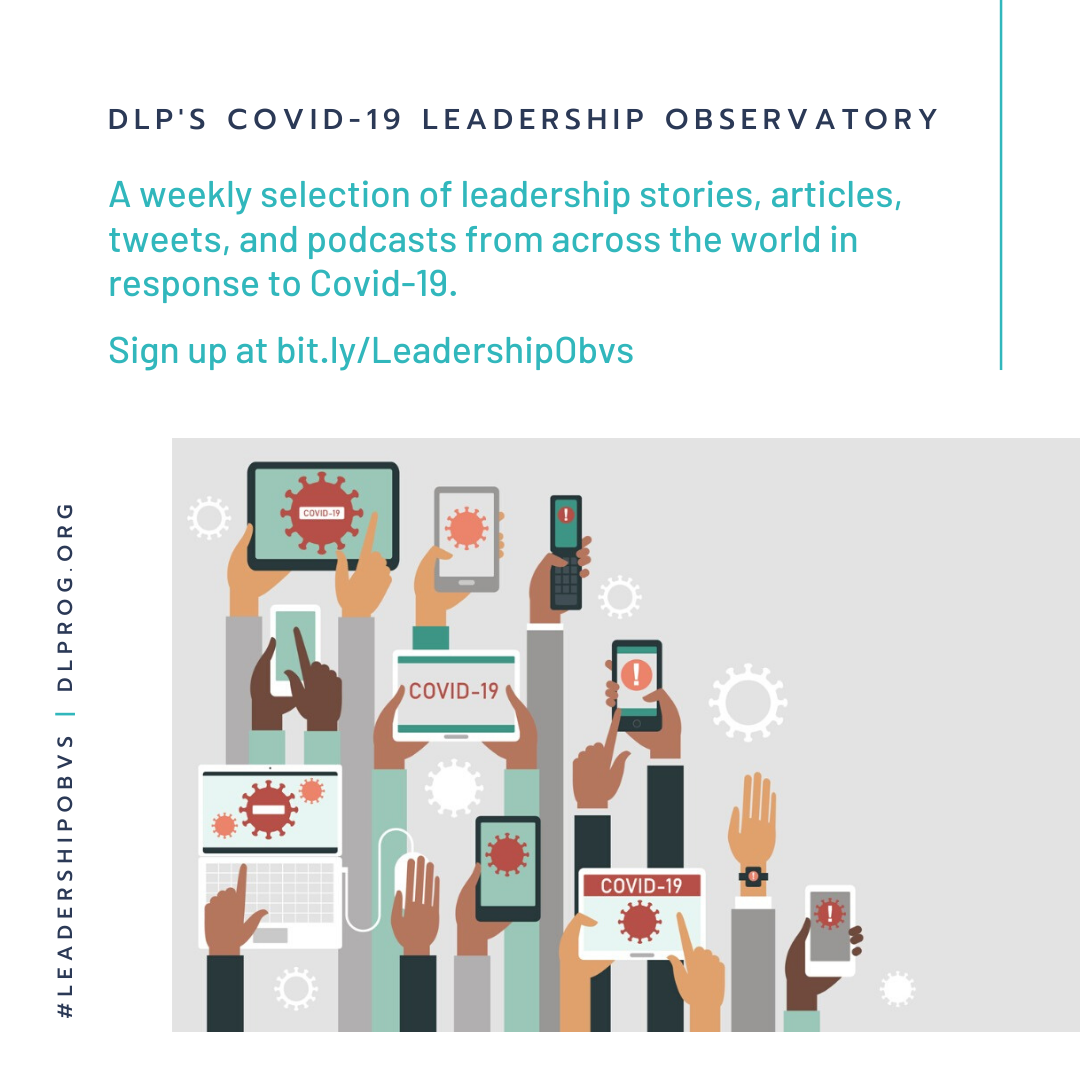During the Covid-19 pandemic, DLP remains committed to supporting leadership, wherever it may be, by helping the flow of knowledge and experience between practitioners, policymakers and researchers. DLP’s weekly #LeadershipObvs collects and summarises all of the leadership focussed resources that we have found most useful for understanding developmental leadership during the crisis – whether they be reports, articles, tweets, videos, podcasts, blogs or other. Covering everything from the challenges of leadership, how to navigate the current conjuncture, how to support processes of leadership, or looking to the future of leadership. Each Observatory is a five-minute read summarising and linking to some of the most helpful work on leadership that week.
Ben Ramalingam, Leni Wild and Matt Ferrari, ‘Adaptive Leadership in the Coronavirus Response: Bridging Science, Policy, and Practice’, ODI, April 2020.
The pandemic has created the need for collective, adaptive leadership because decision-makers are faced with a range of possible interventions to control, mitigate and respond to the crisis. Epidemiological modelling provides guidance, but there remains a great deal of uncertainty and no known best route out of the crisis. Therefore we need to ‘learn intensively [using] real-time data’, as well as building a multi-disciplinary, coordinated response. Leaders need to continue to respond flexibly to new information, implementing policy quickly and effectively to protect public health. This report for policymakers offers guidance to implementing adaptive management in practice, by highlighting (i) the need to adapt, (ii) what needs to adapt, (iii) how to adapt, and (iv) the evidence required.
#LeadershipObvs in a nutshell: Uncertainty means leaders need to test, learn and adapt.
Nancy Koehn, ‘Real Leaders Are Forged in Crisis’, Harvard Business Review, April 2020.
Nancy Koehn argues that real leaders are made in moments of crisis as they are forced to overcome fear and inspire others. While reinforcing quite a traditional view of leadership – individuals as ‘heroic leaders’ – it provides a useful review of how leaders of the past successfully managed through a crisis, identifying the key behaviours that gird and inspire people in difficult times. The blog provides a step by step approach for leaders to take when reviewing their practice in a crisis. Suggestions include acknowledging people’s fears, then encouraging resolve; giving people a role and purpose; and emphasising experimentation and learning. Keep the focus on communicating positive messages to followers to support their emotional needs.
#LeadershipObvs in a nutshell: Leaders are made in crises as they inspire resolve and purpose.
Anna Powles, Jose Sousa-Santos, ‘Covid-19 and Geopolitics in the Pacific’, East Asia Forum, April 2020.
Leadership happens on the frontline, nationally, and locally – this piece examines regional leadership in the Pacific. Covid-19 provides a critical test for regional leadership in the Pacific. Anna Powles and Jose Sousa-Santos detail how the geopolitical contest between China and Australia is playing out. They detail the diplomatic efforts made by both countries, the financing commitments, and the ideological / narrative battles. But more importantly, for the region’s own leadership – and the future of the region – is the space the crisis potentially creates for a regional response coordinated through The Pacific Islands Forum (PIF). While the immediate health threat is the most vital challenge, this crisis could prove to be a critical juncture for Pacific diplomacy. As ever, the choices leaders make and the politics of leadership will shape the outcome.
#LeadershipObvs in a nutshell: COVID-19 is a critical juncture for the future of Pacific diplomacy, but the outcome is unwritten.
Suzie Bailey and Michael West, ‘Covid-19: Why Compassionate Leadership Matters in a Crisis’ The King’s Fund, March 2020.
How should leaders on the frontline act in times of crisis? In our view, too many armchair generals are reaching for war metaphors and calling for tub-thumping leadership. A more considered view is provided by Suzie Bailey and Michael West, who detail how leaning on compassionate leadership can help manage feelings of fear. Uncertainty calls for leaders to draw on all available resources collectively and find solutions, sometimes hour by hour. Leading compassionately will encourage individuals to share valuable insight, experience and wisdom to build resilience in the crisis. In the context of health, organisational culture should create feelings of connection as a collective, feel a sense of belonging, and be given autonomy and control. The role of leaders is to manage workloads and time carefully and sensitively. And with compassion, to enable their teams to be at their best.
#LeadershipObvs in a nutshell: In times of crisis leadership needs to be compassionate to be effective and sustainable.
Luke McGee, ‘Power-hungry Leaders Are Itching to Exploit the Coronavirus Crisis’ CNN World, April 2020.
Leaders are finding opportunities in the pandemic to tighten their grip on power. During a crisis, the window of what governments can get away with without pushback tends to expand. In nations with weak democratic traditions, authoritarian measures implemented by the state are less likely to be ‘rolled back’, making the current situation the new normal. Following the pandemic, leaders – and the decisions and changes made during the crisis – must be made accountable and subject to scrutiny and challenge as soon as practical. Key things to watch out for include the centralisation of power, new laws, new technologies, extended surveillance. Experts also point out the critical role for not just publics and domestic checks and balances, but for the international community.
#LeadershipObvs in a nutshell: Leader watch! Why new laws and technologies introduced during the crisis must be scrutinised and challenged.
Miranda Forsyth and Gordon Peake, ‘Thinking collectively, acting individually: governance in a time of COVID-19’. Devpolicy Blog, 8 April 2020.
A lovely piece by Miranda Forsyth and Gordon Peake on what countries like Australia can learn about public compliance with social distancing and lockdown – from a Pacific approach to governance. They point to examples such as Bougainville and Samoa, showing when and why people were prepared to make individual sacrifices for the collective good. Key were the role of local community leaders, chiefs, priests, pastors, elders, women’s groups, youth groups, and neighbours taking responsibility and exercising leadership at the local scale. The article argues that the regulatory state approach – such as in South Korea and China – is not sufficient. Effective leadership will require understanding how to make people act responsibly through conveying the gravity and immediacy of the situation, reminding people how they can or are being personally affected by it, to encourage individual sacrifices for the collective good.
#LeadershipObvs in a nutshell: What can leaders learn from the Pacific about effective collective compliance?
The #LeadershipObvs is published as part of a DLP response to Covid-19, including a blog series highlighting global, regional, and local leadership practice. DLP is responding to the rapidly changing landscape by sharing ideas and analysis quickly.
To receive the next #LeadershipObvs direct to your inbox, subscribe here.
Sign up to receive the #LeadershipObvs directly to your inbox
A full list of leadership resources
Other resources are available on Twitter using #LeadershipObvs @DLProg











